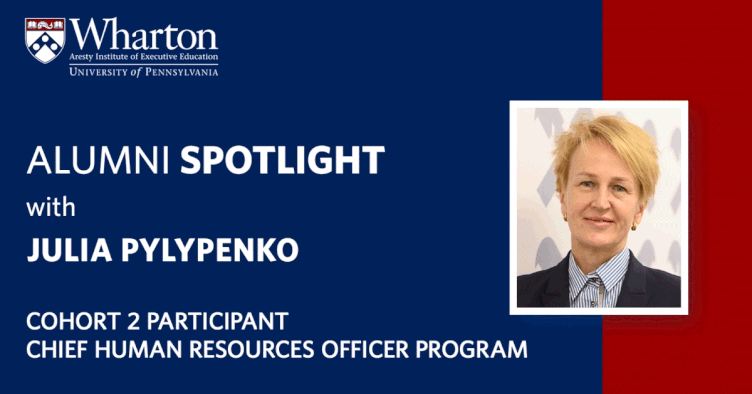Wartime Lessons: Ukrainian Julia Pylypenko Shares Her Journey in Putting People First

- When the War Broke Out, What Was Your First Priority?
- How Did you Deal with Employee Morale? How Did you Balance those Efforts While Keeping Business on Track?
- Will you Continue to Implement These Processes and Changes After the War?
- What You’ve Encountered is Unique and Unexpected. What Advice Would you Give to Others in a Crisis?
- How Did the CHRO Program Benefit you While You were Going Through this Crisis?
- What Advice Would You Give to Someone Who is Considering the CHRO Program?
This article originally appeared on Wharton Executive Education’s LinkedIn page. Program alum in focus: Julia Pylypenko
As human resources director at Raiffeisen Bank Ukraine, Julia Pylypenko has faced many challenges during her tenure, but all pale in comparison to the challenge of overseeing human resources (HR) initiatives during wartime.
With more than 30 years of experience in the business world ― 23 spent in the HR sector ― Pylypenko made a cross-functional move from HR to sales and operations in 2015. She says those moves made a large impact on her professional perspective, helping her become a better business leader and honing her understanding of data.

Today, as head of HR for the biggest commercial bank in Ukraine, Pylypenko joined the Wharton Executive Education Chief Human Resources Officer (CHRO) Program to get a global perspective on how HR works in other geographies and learn about the challenges her peers face. “In terms of the business strategy, processes, and challenges, I found we had so much in common. I was amazed that the difficulties we face in Central Eastern Europe and Ukraine are very similar to those faced by my colleagues from Asia and America. There are differences in cultures and mentalities, but in essence, people are people,” she says.
Pylypenko shares her thoughts on leading HR during wartime and how the CHRO Program has prepared her for the future of people management.
When the War Broke Out, What Was Your First Priority?
During the war, there is no time to discuss how leadership principles should work. Instead, you act based on values. We are lucky to have a very strong CEO, Olexandr Pysaruk, who made it clear that the focus is on people first — the safety and security of our employees and customers.
Next, we empowered our middle management teams to make decisions quickly by dramatically decreasing our pre-war bureaucratic processes. We eliminated things that weren’t productive or efficient, encouraging everyone to make quick decisions and accelerate communications. Although it is wartime, the virtual distance between us was reduced. We also continue to support the 145 employees currently serving in the Ukrainian army in the form of finance. Our bank has made an investment to provide to the employees’ various financial allowances and assistance to their families within and outside of Ukraine.
How Did you Deal with Employee Morale? How Did you Balance those Efforts While Keeping Business on Track?
You cannot underestimate on-time, regular, and relevant communication during a war. Although communication was a focus even before the war, the frequency, channels, and platforms on which we now communicate have increased. We’ve also removed the hierarchy in our communication efforts. Additionally, we hold weekly virtual town hall meetings that give employees exposure to leaders, managers, and work projects.
During the early weeks of the war, we found people had split into groups: those who remained in the occupied territory, those in the “green zone” or free territory, and those who evacuated outside of Ukraine and stayed abroad. We recognized the tension between these groups and worked together to bridge differences during virtual town halls where everyone had an opportunity to speak. These narratives helped each group learn about the challenges, difficulties, and solutions other groups experienced. Through these shared perspectives, people began to understand what their colleagues faced, and a sense of trust was built. It’s a new reality for us.
Although the bank is a hierarchical organization, we eliminated some layers. We used a lot of social media platforms to set up self-organizing communities. Initially, we were fearful of the process in terms of what people would discuss and whether we should monitor these platforms. Ultimately, we decided to relinquish control. We gave people the space to be safe and help each other. A powerful, supportive community has evolved with more than 3,000 colleagues!
Will you Continue to Implement These Processes and Changes After the War?
We will move forward with some of these changes. It’s a new leadership code. Although trauma happened at a personal level, it also happened at an organizational level. The bank itself is going through a huge trauma, and we are changing our leadership DNA to adapt. We have empowered our managers to make decisions and understand that people did, do, and will make mistakes. Moving forward, we will continue this process.
In terms of the bank’s larger role, we play an important role socially and have made a large donation to the Red Cross in support of refugees both within and outside the country. We also give financial support in terms of housing, evacuation costs, and emergency funds to our employees.
The war brought a new dimension that we hadn’t dealt with before ― the information and misinformation space. It’s a hybrid war taking place on the battlefield as well as in the information arena. This realization was important because of how quickly information spreads during a war, and we had to play the role of a business leader and an information leader. Consequently, we are teaching our managers how to deal with information, recognize fake information, and communicate messages to their teams while ensuring to not over-communicate.
The war also created a physical threat to bank infrastructure. Our IT team immediately moved into ensuring cloud migration was done within two months. This was a strategically important move.
What You’ve Encountered is Unique and Unexpected. What Advice Would you Give to Others in a Crisis?
Unfortunately, you cannot compare war to any other crisis. War affects you deeply because it threatens you and the lives of your families, friends, and country. Freedom, which is deeply rooted in us, Ukrainians, is also threatened. Rather than advice, I will share my observations. During a crisis, don’t manage the team too tightly. We learned that people do more if we loosen management strings; they are much smarter, stronger, and wiser than we think. We just need to give people the opportunity to act efficiently. It’s amazing to see what people do for their communities, customers, and teams during these uneasy times.
How Did the CHRO Program Benefit you While You were Going Through this Crisis?
Before the war, we faced employee reintegration challenges due to the pandemic and implementing digital transformation measures. When I saw the CHRO Program, I thought it might help me solve these challenges. Though the war hit while I was enrolled in the program, I did not get deterred. Even during a war, learning does not stop, and I did not let it stop me from continuing the program.
My major takeaway from this program was developing a growth mindset and the chance to continue learning even during a deep crisis. You are not born with a growth mindset; you need to develop it. This program is a great way to train your brain and develop your growth mindset.
The elective Future of Work showed how to balance a communication agenda, operational activity, people management, and regular business. It also gave me a perspective on how to prioritize short- and long-term challenges to be efficient during war while understanding how the migration of labor ― roughly 5 million Ukrainian citizens ― has impacted Ukraine and the host countries.
The entire process of learning was very deep and engaging. I would carve out dedicated time on the weekends to engage in the lectures. It was a huge professional and personal delight. Now that the program is over, I miss that feeling. I plan to revisit some program information for deeper reflection.
What Advice Would You Give to Someone Who is Considering the CHRO Program?
My advice would be: Take it! Don’t hesitate. In fact, I am proud to say that it was my husband who invested for me to enroll in the program, and the payback is absolutely precious. You will get so much back in terms of learning, interacting with your peers, and opening your mind to new trends in people management.
You can learn more about the Wharton Executive Education Chief Human Resources Officer (CHRO) Program by visiting our program homepage.




